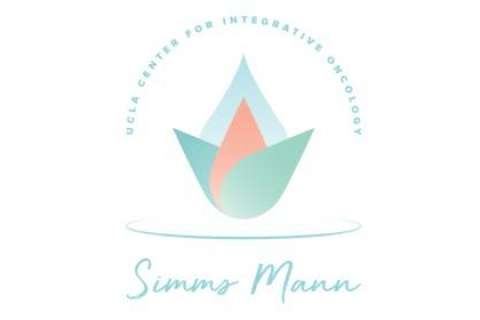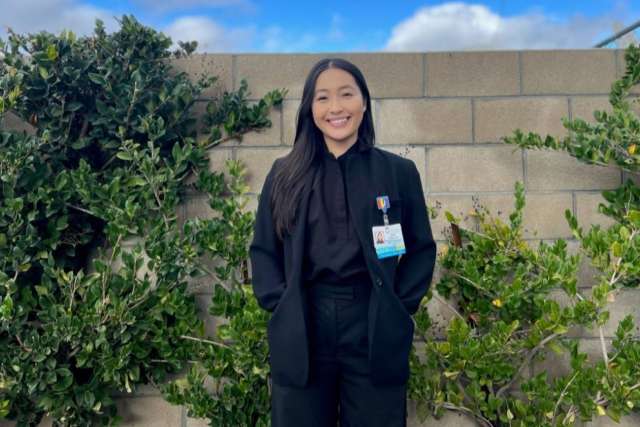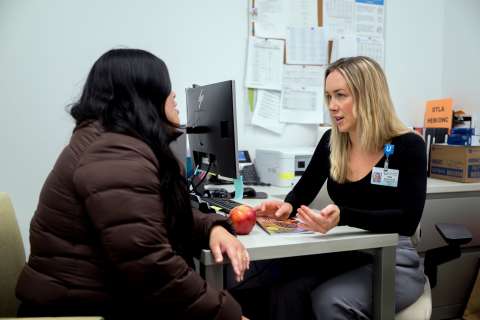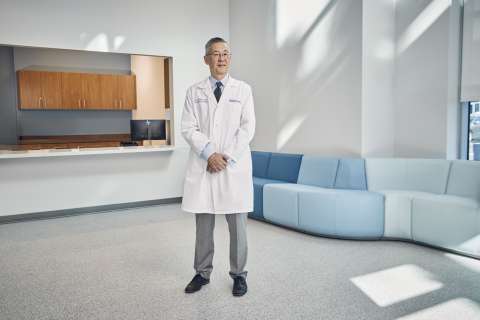It is one thing to provide state-of-the-art medical care for those suffering from such a serious condition as cancer. But it is a whole extra challenge to make sure that this care is accessible to all groups, in a very diverse region of blended cultures and languages.
This has been the grand focus of the Simms/Mann-UCLA Center for Integrative Oncology, part of UCLA Health’s community clinics that provide integrative care for individuals and families who have been affected by cancer. Simms/Mann caregivers focus on "treating the whole person," helping them to strengthen their mind, body and spirit.
UCLA Health clinics reach far and wide across Southern California, from San Luis Obispo to Laguna Hills and throughout Los Angeles, to make leading-edge care available and welcoming to people in diverse communities across the region. They go beyond high-tech cancer treatment, however, by offering services such as Qi Gong and nutrition programs, as well as counseling for psychological wellness and emotional support.
Thanks to support from the Simms/Mann Family Foundation Endowment, UCLA Health is able to provide these modern programs at 20 clinics, giving patients access to the best possible care for free right in their own communities. But the clinics provide much more than saving patients the grueling drive to distant locations for treatment.
The Simms/Mann Center, which is part of the UCLA Jonsson Comprehensive Cancer Center and the Division of Hematology/Oncology in the David Geffen School of Medicine at UCLA, delivers this care with an understanding of the language and culture of the local communities.
A psychologist’s dream come true
For Jenny Tran, PhD, a postdoctoral fellow at the Simms/Mann Center, this is a dream come true. As an Asian American who grew up in Los Angeles, she knows from experience that sometimes people within the Asian and Asian American community are reluctant to reach out for help regarding mental health concerns.
"I chose to pursue a career in psychology, as an Asian American, partially because I recognize how mental health can be neglected or misunderstood and available resources might not be utilized in our communities due to stigma or incongruence to their needs. So, I always felt there was a calling, in which I wanted to provide that kind of human touch to those who might be suffering," she said.
Dr. Tran landed at her perfect spot, representing Simms/Mann at the Alhambra Cancer Care clinic, located within a large Asian immigrant community.
"This is right where I want to be. I love the team and the culture, and the opportunity at UCLA to go back to my community to do mental health work," Dr. Tran said. "I just never imagined this opportunity would present itself so early in my career. I treasure it because there is so much potential to reach out to the community, every time I meet with a patient here at our Alhambra location."
The Alhambra site is the perfect model of the vision of the Simms/Mann Center, said Barbara Jagels, RN, senior director of Cancer Services at UCLA Health.
"The Alhambra clinic is a great example of our delivery of culturally congruent care," Jagels said, adding that speaking a patient's language can make all the difference in helping that person feel comfortable seeking and receiving cancer treatments.
"Everyone who works at the Alhambra clinic is at least bilingual, and some are trilingual – from the people answering the phones to the people who provide the care, to the Simms/Mann provider who provides psychological and social support," Jagels said. "In fact, when you visit that clinic, English is rarely even used."
This is where Dr. Tran comes in, often to invite patients to take advantage of the support services that are available to them.
"We try to support them early on in their treatment, and make sure they know that we are here with them the whole way in their process, to help alleviate as much of their suffering as we can."
Dr. jenny tran, on her relationship with Simms/Mann patients
"I'm often the first therapist they have ever met in any health setting, and I recognize it is different when I ask how they are doing mentally and emotionally," Dr. Tran said. "And I always start out by telling them that it is OK to feel what it is that they are going through, to think what they are thinking right now, and that they can talk about it with me if they want."
When they are undergoing serious and painful treatment for cancer that might include surgery, radiation and chemotherapy, there is plenty to talk about.
"I emphasize to them that it is understandable to be struggling with this and to want to talk about it – this is really hard to go through and to cope with," Dr. Tran said, noting that counseling and other support services can be very beneficial to family members as well.
"Sometimes they will say that they are doing fine, but then I will hear from them weeks later or seem the next time they come in for treatment and they are ready to share more,” she said. "Then we can really jump in and say, ‘Alright, let's process this,’ and let’s figure out together what else you need that can make this cancer experience a little easier."
Drawing from personal experience
Dr. Tran knows all about health battles, on a deeply personal level. When she was 18, her father had a stroke, and she and her mother and sister became his caregivers.
"For me, I experienced how chronic illness can completely change a person's life. It can change your mental health, your overall well-being, and even your personal identity," she said. "I was going through all of these challenges when I was 18, a very significant developmental period of early adulthood. When I thought about my future career goals, I imagined how I might be able to help someone going through something similarly challenging. My experience being a caregiver for my dad really aligns with the work I do with my patients."
In addition to her work at the Alhambra center for the past year, Dr. Tran also manages the psychosocial care within the UCLA Advanced GI Cancer Program, which includes nutrition oncology and palliative care services. She sees patients who are going through complex medical issues and coping with extreme pain and suffering, with anxiety about their lives or those of their loved ones.
"These people are going through real issues of quality of life from cancers in their general intestines, colon, liver, or pancreas. They often require a high level of care and support with the goal of living as long and as comfortably as possible with this," Dr. Tran said.
The barrage of pain and treatments and the idea of needing to ‘be strong’ can take a psychological toll on a patient and loved ones, so therapists such as Dr. Tran are a key component of the path to wellness. But it is help that patients and families must know is available and be willing to accept.
"Oftentimes people don't know that we exist until they need us or are deeply in distress. Fortunately, their doctors tell them that we can help and are here for them. And it makes a difference when it comes from their doctor. It is almost like getting permission to get help for ‘the other stuff.’ A doctor or other medical provider might refer a patient after having a tough conversation about their disease progression or prognosis. Or at the end of their active treatment when the weekly visits stop and there is this sense of pressure to ‘return to normal,’ Dr. Tran said. "It is really important that they know we are here and eager to help them with all of that, at any stage of their cancer experience.”
"We really want to connect with them sooner rather than later, when their suffering or quality of life is at its worst," she said. "We try to support them early on in their treatment, and make sure they know that we are here with them the whole way in their process, to help alleviate as much of their suffering as we can."
Dr. Tran knows that every time she and her colleagues help patients and families get through the grind of cancer treatment, the word spreads through the community and others become more willing to ask for the kind of help Simms/Mann can provide.
"I believe that we are just kind of scratching the surface. This will grow, and we will be able to do more and more for our patients and for their families," she says.
Emotions run high for patient and caregiver
Providing all of this intense, hands-on care can become very personal for caregivers.
"We don't just hear about their struggles – we also witness these profound moments when a patient is confronting their fears and giving themselves permission to feel emotions that they think they are not allowed to feel or talk about," Dr. Tran said.
"There are moments when it feels really heavy and emotional because I care about my patients and sit with them in those hard places,” she said. “It reminds me of losing my dad and how that kind of grief can feel. However, channeling my grief allows me to deepen my connection with my patients. It is this ‘knowing’ of what loss feels like or experiencing 'anticipatory grief' of the hard road ahead. They might be feeling that for the first time, and we feel it with them; they are not alone. While it's not like this work directly lessens the physical pain, it can facilitate emotional release and allows for moments to feel less heavy, lighter, and easier to carry."
These moments, she said, represent all the reasons why she went into this field.

This special care at the community level is made possible by grants from the Simms/Mann Family Foundation, which partnered with UCLA 20 plus years ago and recently made an $18 million endowment gift to help continue the Simms/Mann community services in perpetuity – adding up to total lifetime giving to the Center of $30 million.
"The program with Simms/Mann is really successful, and it is very unique as an academic cancer treatment program," Jagels said. “It is entirely donor funded, and the treatments are provided to the patients entirely for free. It is innovative as well, in offering integrative services that are state of the art."
Victoria Mann Simms, PhD, a psychologist and president of the Simms/Mann Family Foundation, is always happy to hear positive feedback form patients and UCLA medical providers.
Her father was treated at UCLA Health for cancer, and she thought then that cancer treatment should be more holistic. She and her family wanted to be involved in progressing the notion of treating the "whole person."
"The mind affects the body, and the body effects the mind," Mann Simms said. "This comes from the belief that science cures, but the soul heals. There is that healing part of the soul that is not always addressed. That is the reason the Center was created.”
Learn more about services offered through the Simms/Mann-UCLA Center for Integrative Oncology.
Tina Daunt is the author of this article.




